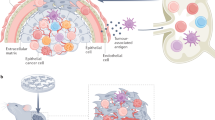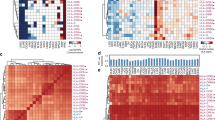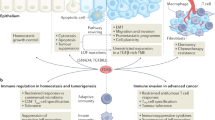Abstract
The transcription factor Wilms' tumour gene 1 (WT1) is important as a prognostic marker as well as in the detection and monitoring of minimal residual disease in leukaemia and myelodysplastic syndromes. Evidence has accumulated over the past decade to show that WT1 is a key molecule for tumour proliferation in a large number of human neoplasms most prominent in acute leukaemias, making it a suitable target for therapeutic strategies. Based on animal results, showing safety and efficacy of immunization with WT1 peptides and protein, early clinical trials in leukaemia have recently been initiated. The First International Conference on WT1 in Human Neoplasia was held in Berlin, March 11–12, 2004. This report reviews the current knowledge on the role of WT1 in tumour promotion and as a diagnostic and therapeutic target, and summarizes the data presented and discussed in this meeting.
This is a preview of subscription content, access via your institution
Access options
Subscribe to this journal
Receive 12 print issues and online access
$259.00 per year
only $21.58 per issue
Buy this article
- Purchase on Springer Link
- Instant access to full article PDF
Prices may be subject to local taxes which are calculated during checkout
Similar content being viewed by others
References
Call KM, Glaser T, Ito CY, Buckler AJ, Pelletier J, Haber DA et al. Isolation and characterization of a zinc finger polypeptide gene at the human chromosome 11 Wilms' tumor locus. Cell 1990; 60: 509–520.
Rose EA, Glaser T, Jones C, Smith CL, Lewis WH, Call KM et al. Complete physical map of the WAGR region of 11p13 localizes a candidate Wilms' tumor gene. Cell 1990; 60: 495–508.
Haber DA, Buckler AJ, Glaser T, Call KM, Pelletier J, Sohn RL et al. An internal deletion within an 11p13 zinc finger gene contributes to the development of Wilms' tumor. Cell 1990; 61: 1257–1269.
Miwa H, Beran M, Saunders GF . Expression of the Wilms' tumor gene (WT1) in human leukemias. Leukemia 1992; 6: 405–409.
Inoue K, Sugiyama H, Ogawa H, Nakagawa M, Yamagami T, Miwa H et al. WT1 as a new prognostic factor and a new marker for the detection of minimal residual disease in acute leukemia. Blood 1994; 84: 3071–3079.
Algar EM, Khromykh T, Smith SI, Blackburn DM, Bryson GJ, Smith PJ . A WT1 antisense oligonucleotide inhibits proliferation and induces apoptosis in myeloid leukaemia cell lines. Oncogene 1996; 12: 1005–1014.
Gao L, Bellantuono I, Elsasser A, Marley SB, Gordon MY, Goldman JM et al. Selective elimination of leukemic CD34(+) progenitor cells by cytotoxic T lymphocytes specific for WT1. Blood 2000; 95: 2198–2203.
Ohminami H, Yasukawa M, Fujita S . HLA class I-restricted lysis of leukemia cells by a CD8+ cytotoxic T-lymphocyte clone specific for WT1 peptide. Blood 2000; 95: 286–293.
Oka Y, Elisseeva OA, Tsuboi A, Ogawa H, Tamaki H, Li H et al. Human cytotoxic T lymphocyte responses specific for peptides of wild-type Wilms tumor gene WT1 product. Immunogenetics 2000; 51: 99–107.
Menke AL, Schedl A . WT1 and glomerular function. Semin Cell Dev Biol 2003; 14: 233–240.
Oji Y, Miyoshi S, Maeda H, Hayashi S, Tamaki H, Nakatsuka S et al. Overexpression of the Wilms' tumor gene WT1 in de novo lung cancers. Int J Cancer 2002; 100: 297–303.
Oji Y, Nakamori S, Fujikawa M, Nakatsuka S, Yokota A, Tatsumi N et al. Overexpression of the Wilms' tumor gene WT1 in pancreatic ductal adenocarcinoma. Cancer Sci 2004; 95: 583–587.
King-Underwood L, Pritchard-Jones K . Wilms' tumor (WT1) gene mutations occur mainly in acute myeloid leukemia and may confer drug resistance. Blood 1998; 91: 2961–2968.
Dehbi M, Gharemani M, Lechner M, Dressler G, Pelletier J . The paired-box transcription factor, PAX2, positively modulates expression of the Wilms' Tumor suppressor gene. Oncogene 1996; 13: 447–453.
Dehbi M, Pelletier J . Pax-8-mediated activation of the WT1 tumor suppressor gene. EMBO J 1996; 16: 4297–4306.
Wu Y-J, Fraizer GC, Saunders GF . GATA-1 transactivates the WT1 hematopoietic specific enhancer. J Biol Chem 1995; 270: 5944–5949.
Siehl JM, Thiel E, Heufelder K, Snarski E, Schwartz S, Mailander V et al. Possible regulation of Wilms' tumour gene 1 (WT1) expression by the paired box genes PAX2 and PAX8 and by the haematopoietic transcription factor GATA-1 in human acute myeloid leukemias. Br J Haematol 2003; 123: 235–242.
Scharnhorst V, van der Eb AJ, Jochemsen AG . WT1 proteins: functions in growth and differentiation. Gene 2001; 273: 141–161.
Menssen HD, Renkl HJ, Rodeck U, Maurer J, Notter M, Schwartz S et al. Presence of Wilms' tumor gene (wt1) transcripts and the WT1 nuclear protein in the majority of human acute leukemias. Leukemia 1995; 9: 1060–1067.
Inoue K, Ogawa H, Sonoda Y, Kimura T, Sakabe H, Oka Y et al. Aberrant overexpression of the Wilms tumor gene (WT1) in human leukemia. Blood 1997; 89: 1405–1412.
Baird PN, Simmons PJ . Expression of the Wilms' tumor gene (WT1) in normal hematopoiesis. Exp Hematol 1997; 25: 312–320.
Van Dijk JP, Knops GHJN, Van de Locht LTF, Menke AL, Janssen JH, Mensink EJB et al. Abnormal WT1 expression in the CD34-negative compartment in myelodysplastic bone marrow. Br J Haematol 2002; 118: 1027–1033.
Inoue K, Ogawa H, Yamagami T, Soma T, Tani Y, Tatekawa T et al. Long-term follow-up of minimal residual disease in leukemia patients by monitoring WT1 (Wilms tumor gene) expression levels. Blood 1996; 88: 2267–2278.
Cilloni D, Gottardi E, De Micheli D, Serra A, Volpe G, Messa F et al. Quantitative assessment of WT1 expression by real time quantitative PCR may be a useful tool for monitoring minimal residual disease in acute leukemia patients. Leukemia 2002; 16: 2115–2121.
Ogawa H, Tamaki H, Ikegame K, Soma T, Kawakami M, Tsuboi A et al. The usefulness of monitoring WT1 gene transcripts for the prediction and management of relapse following allogeneic stem cell transplantation in acute type leukemia. Blood 2003; 101: 1698–1704.
Cilloni D, Saglio G . WT1 as a universal marker for minimal residual disease detection and quantification in myeloid leukemias and in myelodysplastic syndrome. Acta Haematol 2004; 112: 79–84.
Cilloni D, Gottardi E, Messa F, Fava M, Scaravaglio P, Bertini M, et al., Piedmont Study Group on Myleodysplastic Syndromes. Significant correlation between the degree of WT1 expression and the International Prognostic Scoring System Score in patients with myelodysplastic syndromes. J Clin Oncol 2003; 21: 1988–1995.
Tamaki H, Ogawa H, Ohyashiki K, Ohyashiki JH, Iwama H, Inoue K et al. The Wilms tumor gene is a good marker for diagnosis and disease progression of myelodysplastic syndromes. Leukemia 1999; 13: 393–399.
Kletzel M, Olzewski M, Huang W, Chou PM . Utility of WT1 as a reliable tool for the detection of minimal disease in children with leukemia. Pediatr Dev Pathol 2002; 5: 269–275.
Trka J, Kalinová M, Hrusák O, Zuna J, Krejci O, Madzo J, et al., For Czech Paediatric Haematology Working Group. Real-time quantitative PCR detection of WT1 gene expression in children with AML: prognostic significance, correlation with disease status and residual disease detection by flow cytometry. Leukemia 2002; 16: 1381–1389.
Miyamura T, Sakata N, Okamura T, Yasui M, Inoue M, Yagi K et al. Clinical significance of minimal residual disease in childhood acute myeloid leukemia. Int J Hematol 2004; 79: 243–249.
Gaiger A, Reese V, Disis ML, Cheever MA . Immunity to WT1 in the animal model and in patients with acute myeloid leukemia. Blood 2000; 96: 1480–1489.
Oka Y, Udaka K, Tsuboi A, Elisseeva OA, Ogawa H, Aozasa K et al. Cancer immunotherapy targeting Wilms tumor gene WT1 product. J Immunol 2000; 164: 1873–1880.
Tsuboi A, Oka Y, Ogawa H, Elisseeva OA, Li H, Kawasaki K et al. Cytotoxic T-lymphocyte responses elicited to Wilms' tumor gene WT1 product by DNA vaccination. J Clin Immuol 2000; 20: 195–202.
Stanislawski T, Voss RH, Lotz C, Sadovnikova E, Willemsen RA, Kuball J et al. Circumventing tolerance to a human MDM2-derived tumor antigen by TCR gene transfer. Nat Immunol 2001; 2: 962–970.
Bendle GM, Holler A, Pang LK, Hsu S, Krampera M, Simpson E et al. Induction of unresponsiveness limits tumor protection by adoptively transferred MDM2-specific cytotoxic T lymphocytes. Cancer Res 2004; 64: 8052–8056.
Kuball J, Schmitz FW, Voss RH, Ferreira EA, Engel R, Guillaume P et al. Cooperation of human tumor-reactive CD4+ and CD8+ T cells after redirection of their specificity by a high-affinity p53A2.1-specific TCR. Immunity 2005; 22: 117–129.
Makita M, Hiraki A, Azuma T, Tsuboi A, Oka Y, Sugiyama H et al. Antilung Cancer Effect of WT1-specific cytotoxic T lymphocytes. Clin Cancer Res 2002; 8: 2626–2631.
Nakajima H, Kawasaki K, Oka Y, Tsuboi A, Kawakami M, Ikegame K et al. WT1 peptide vaccination combined with BCG-CWS is more efficient for tumor eradication than WT1 peptide vaccination alone. Cancer Immunol Immunother 2004; 53: 617–624.
Azuma T, Otsuki T, Kuzushima K, Froelich CJ, Fujita S, Yasukawa M . Myeloma cells are highly sensitive to the granule exocytosis pathway mediated by WT1-specific cytotoxic T lymphocytes. Clin Cancer Res 2004; 10: 7402–7412.
Scheibenbogen C, Letsch A, Thiel E, Schmittel A, Mailaender V, Baerwolf S et al. CD8 T cell responses to Wilms' tumor gene encoded protein WT1 and proteinase 3 in patients with acute myeloid leukemia. Blood 2002; 100: 2132–2137.
Gaiger A, Carter L, Greinix H, Carter D, McNeill PD, Houghton RL et al. WT1-specific serum antibodies in patients with leukemia. Clin Cancer Res 2001; 7 (Suppl. 3): 761s–765s.
Rezvani K, Grube M, Brenchley JM, Sconocchia G, Fujiwara H, Price DA et al. Functional leukemia-associated antigen-specific memory CD8+ T cells exist in healthy individuals and in patients with chronic myelogenous leukemia before and after stem cell transplantation. Blood 2003; 102: 2892–2900.
Wu F, Oka Y, Tsuboi A, Elisseeva OA, Ogata K, Nakajima H et al. Th-biased humoral immune responses against Wilms tumor gene WT1 product in the patients with hematopoietic malignancies. Leukemia 2005; 19: 268–274.
Rosenfeld C, Cheever MA, Gaiger A . WT1 in acute leukemia, chronic myelogenous leukemia and myelodysplastic syndrome: therapeutic potential of WT1 targeted therapies. Leukemia 2003; 17: 1301–1312.
Mailaender V, Scheibenbogen C, Thiel E, Letsch A, Blau IW, Keilholz U . Complete remission in a patient with recurrent acute myeloid leukemia induced by vaccination with WT1 peptide in the absence of hematological or renal toxicity. Leukemia 2004; 18: 165–166.
Tsuboi A, Oka Y, Udaka K, Murakami M, Masuda T, Nakano A et al. Enhanced induction of human WT1-specific cytotoxic T lymphocytes with a 9-mer WT1 peptide modified at HLA-A*2402-binding residues. Cancer Immunol Immunother 2003; 51: 614–620.
Oka Y, Tsuboi A, Murakami M, Hirai M, Tominaga N, Nakajima H et al. Wilms tumor gene peptide-based immunotherapy for patients with overt leukemia from myelodysplastic syndrome or MDS with myelofibrosis. Int J Hematol 2003; 78: 56–61.
Tsuboi A, Oka Y, Osaki T, Kumagai T, Tachibana I, Hayashi S et al. WT1 peptide-based immunotherapy for patients with lung cancer: two case report. Microbiol Immunol 2004; 48: 175–184.
Oka Y, Tsuboi A, Taguchi T, Osaki T, Kyo T, Nakajima H et al. Induction of WT1-specific cytotoxic T lymphocytes by WT1 peptide vaccine and the resultant cancer regression. Proc Natl Acad Sci USA 2004; 101: 13885–13890.
Author information
Authors and Affiliations
Corresponding author
Rights and permissions
About this article
Cite this article
Keilholz, U., Menssen, H., Gaiger, A. et al. Wilms' tumour gene 1 (WT1) in human neoplasia. Leukemia 19, 1318–1323 (2005). https://doi.org/10.1038/sj.leu.2403817
Received:
Accepted:
Published:
Issue Date:
DOI: https://doi.org/10.1038/sj.leu.2403817
Keywords
This article is cited by
-
Real-time assessment of relapse risk based on the WT1 marker in acute leukemia and myelodysplastic syndrome patients after hematopoietic cell transplantation
Bone Marrow Transplantation (2015)
-
High WT1 mRNA expression after induction chemotherapy and FLT3-ITD have prognostic impact in pediatric acute myeloid leukemia: a study of the Japanese Childhood AML Cooperative Study Group
International Journal of Hematology (2012)
-
Promising Role of Reduced-Toxicity Hematopoietic Stem Cell Transplantation (PART-I)
Stem Cell Reviews and Reports (2012)
-
Monitoring of WT1 expression in PB and CD34+ donor chimerism of BM predicts early relapse in AML and MDS patients after hematopoietic cell transplantation with reduced-intensity conditioning
Leukemia (2011)
-
Wilms’ tumor 1 silencing decreases the viability and chemoresistance of glioblastoma cells in vitro: a potential role for IGF-1R de-repression
Journal of Neuro-Oncology (2011)



